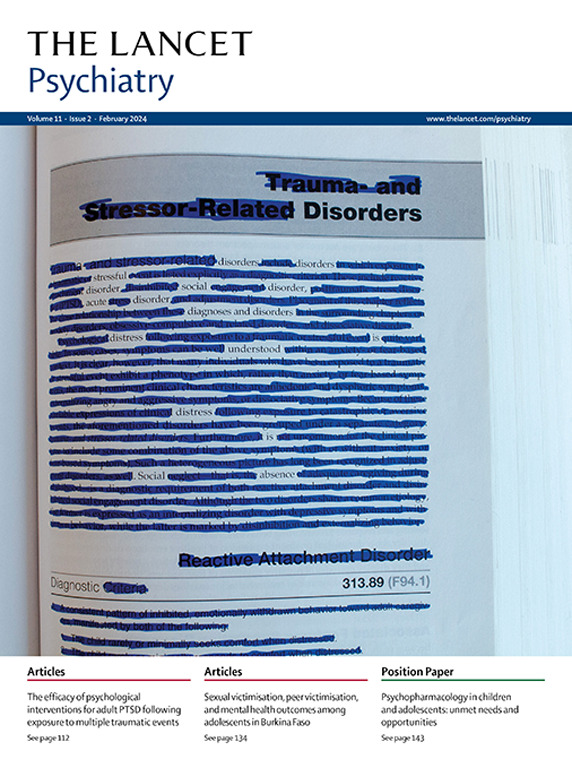Factors that affect the resilience of young adults to depression: a systematic review
IF 30.8
1区 医学
Q1 PSYCHIATRY
引用次数: 0
Abstract
Depression among young people (aged 18–29 years) transitioning to adulthood is becoming more widespread. Knowing which factors in which systems co-enable resilience to depression is crucial, but there is no comprehensive synthesis of the physiological, psychological, social, economic, institutional, cultural, and environmental system factors associated with no or minimal emerging adult depression, or combinations of these factors. We have therefore conducted a preregistered systematic review (Prospero, CRD42023440153). We searched eight databases for observational studies reporting factors associated with depression symptomology that is mild, minimal, or absent among emerging adults with exposure to risk factors for depression; independently screened titles, abstracts, and full texts; extracted data; and assessed study quality. From 1824 unique citations, we included 139 papers (N=17721; in study populations that are majority female, cisgender, and in North America) and conducted a multisystemic resilience-informed narrative synthesis and quantitative summary. Personal (eg, psychological resilience and positive cognition) or social factors (eg, social support and family support) were frequently linked to reduced depression symptomology, followed by combinations of these. Economic, institutional, cultural, and environmental factors, or combinations of factors from three or more systems, were rarely reported. Low-income and middle-income countries, in which most young people live, were under-represented, which suggests inadequate understanding of emerging adult resilience to depression. Future studies should include more diverse populations and redress the tendency to reduce resilience to depression to a psychological or limited social phenomenon.影响青壮年抑郁症恢复能力的因素:系统性综述
在过渡到成年期的年轻人(18-29岁)中,抑郁症正变得越来越普遍。了解哪些因素在哪些系统中共同使抗抑郁能力增强是至关重要的,但目前还没有全面综合与没有或很少出现成人抑郁症相关的生理、心理、社会、经济、制度、文化和环境系统因素,或这些因素的组合。因此,我们进行了预注册的系统评价(Prospero, CRD42023440153)。我们在8个数据库中检索了观察性研究,这些研究报告了在暴露于抑郁症危险因素的新生成人中与抑郁症状相关的因素是轻微的、最小的或不存在的;独立筛选标题、摘要和全文;提取的数据;评估研究质量。从1824次独特引用中,我们纳入了139篇论文(N=17721;在研究人群中,大多数是女性、顺性别和北美),并进行了多系统弹性信息的叙事综合和定量总结。个人因素(如心理弹性和积极认知)或社会因素(如社会支持和家庭支持)通常与抑郁症症状的减少有关,其次是这些因素的组合。经济、制度、文化和环境因素,或来自三个或更多系统的因素组合,很少被报道。大多数年轻人生活的低收入和中等收入国家的代表性不足,这表明对正在出现的成年人抗抑郁能力的了解不足。未来的研究应该包括更多样化的人群,并纠正将抑郁症的恢复力降低为心理或有限社会现象的趋势。
本文章由计算机程序翻译,如有差异,请以英文原文为准。
求助全文
约1分钟内获得全文
求助全文
来源期刊

Lancet Psychiatry
PSYCHIATRY-
CiteScore
58.30
自引率
0.90%
发文量
0
期刊介绍:
The Lancet Psychiatry is a globally renowned and trusted resource for groundbreaking research in the field of psychiatry. We specialize in publishing original studies that contribute to transforming and shedding light on important aspects of psychiatric practice. Our comprehensive coverage extends to diverse topics including psychopharmacology, psychotherapy, and psychosocial approaches that address psychiatric disorders throughout the lifespan. We aim to channel innovative treatments and examine the biological research that forms the foundation of such advancements. Our journal also explores novel service delivery methods and promotes fresh perspectives on mental illness, emphasizing the significant contributions of social psychiatry.
 求助内容:
求助内容: 应助结果提醒方式:
应助结果提醒方式:


